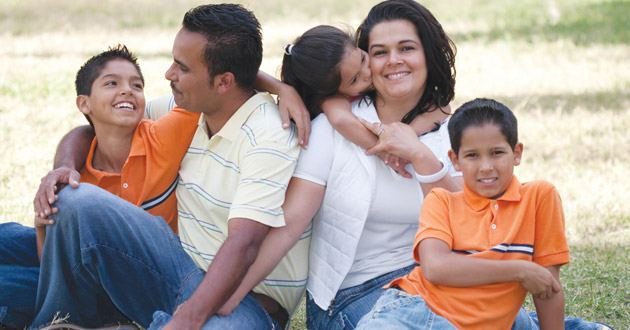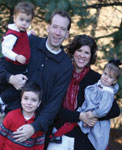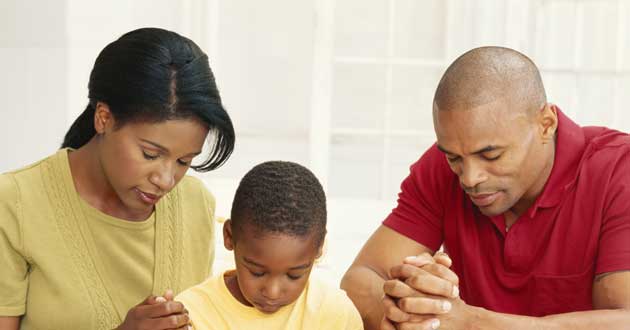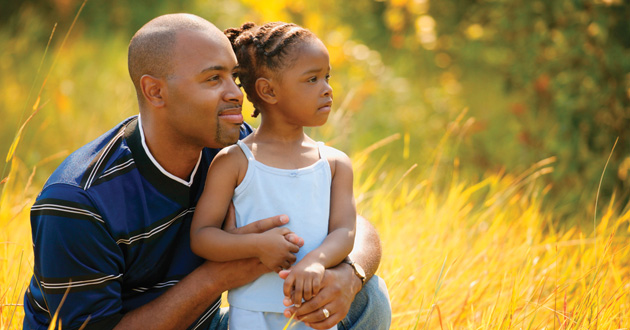4 ways to make every kid in a large family feel special

There’s a humorous but wise adage that many parents who are having their third child eventually hear: “Man-to-man defense no longer applies. You’ll have to switch to a zone.”
The meaning in a nutshell? The kids now outnumber the parents.
I had heard friends talk about the blessings and challenges of a larger family but didn’t fully understand it until my wife and I added twins to our “bunch,” which automatically bumped our small family of three to a “large” family of five – thereby putting us at that out-of-the-way corner booth in all the restaurants. No longer would we fit at 95 percent of the restaurant tables or 99 percent of the hotel rooms.
That also meant it was not possible for each child to be held, for each kid to receive individual attention, for each child to sit in a lap. I’ve always been one who wants to see needs met, so it was a major adjustment. After all, I physically couldn’t read a story to my twins and ride bike with my oldest son at the same time – even though I wanted to do both. (It did, though, put me in awe of God more, because He can comfort the little boy in China and the little girl in America simultaneously.)
So can a mother and father of multiple kids still make each one feel special? Yes. Here are four suggestions:
1. Spotlight the “unique.” Two of my kids are skilled readers for their age, but one is not. But that third child is smarter in other areas, obeys more readily, and is even more loving. Perhaps the former two will grow up to be scientists or researchers and the latter one a therapist. Who knows? God made each of my kids unique, with different strengths, and they should hear early and often that Mom and Dad recognize and appreciate those distinctive God-given qualities. The Bible says God “knitted” each child (Psalm 139). Our children should never hear us compare them to one another, much less hear us say, “Why can’t you be more like your” brother or sister? Each of them is “knitted,;” each of them is beautiful—but different.
2. Go one-on-one. The fact that you’re a large family doesn’t mean every event has to be a group activity. Be intentional about planning, for instance, a “daddy-daughter night,” and make sure each child knows that his or her night is coming up, too. Go to the park or eat ice cream or even enjoy a meal together. Can’t do that as much as you’d like? Then do it at home, or take advantage of spontaneous situations. If three out of four kids are playing well together in the other room, read a book or play with that fourth kid—until you’re discovered, of course.
3. Be a team. Those one-on-one activities are essential, but don’t go overboard. It’s critical that my children—and yours—understand that each member of the family is important, working toward a common goal. Today’s goal may be as simple as setting the table or being pleasant in the car or cleaning the house. Just like a body, no member is more important, and just like a body, each member has a vital role. Thus, even in group activities, each child can feel unique and special. Group activities also can help a family grow closer. Once, when I saw that two of my children weren’t getting along, I began planning activities where just the two of them would interact. It worked. Soon, they seemingly were best friends.
4. Don’t play favorites. It can destroy a family and spark sibling rivalries, and children can see it even if we don’t intend it. Perhaps a new baby comes along, and we accidentally ignore the oldest child. Or maybe we focus too much on that oldest child—the “first borne”—as the youngest baby ages. I have had to guard against unintentional favoritism in buying souvenirs, thinking it was a waste of money to buy gifts for a 4-month-old but then not recognizing the moment when that child reached awareness and actually wanted a gift.
Last, be honest and frank. After we added the twins to our family, I asked my oldest what I thought was a tough question for his age: “Who do you think I should love more: you, the twins, or should I love you all equally?” Thankfully, he got the answer right.
— by Michael Foust
Foust is an editor and writer, the father of three small children, and blogs about parenting at MichaelFoust.com.





